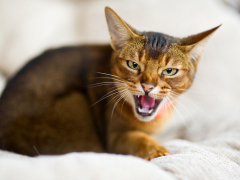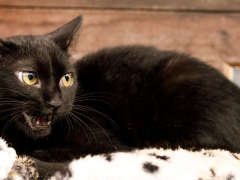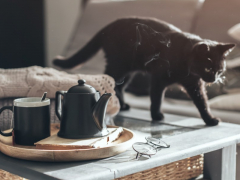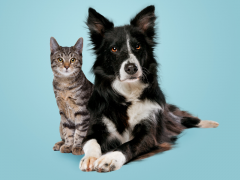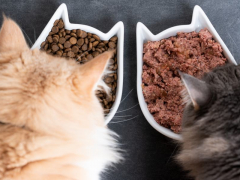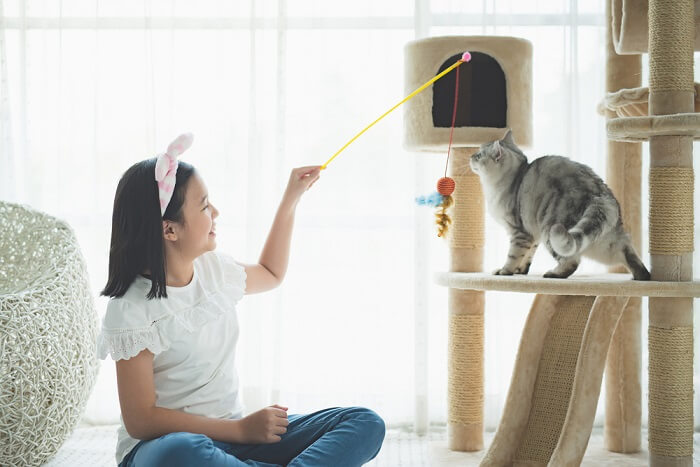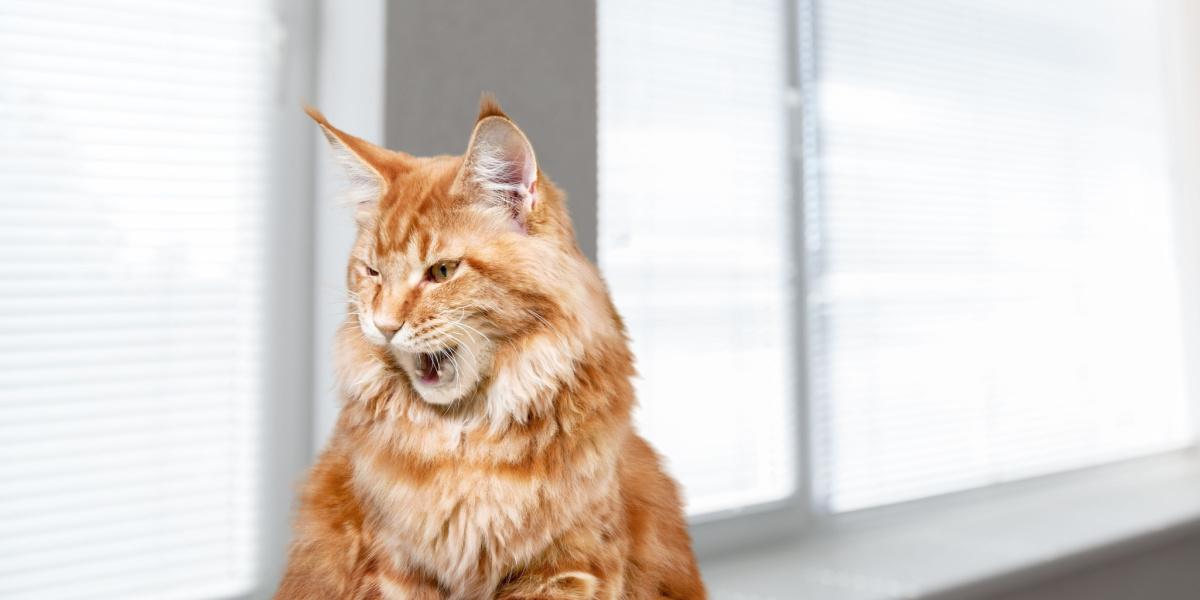
Whether you’ve got a cat that’s making a chittering noise or have simply seen cats chattering on the internet, it’s understandable that you’d want to know why some cats make this most un-cat-like noise.
A far cry (excuse the pun!) from the traditional meow, a cat’s chatter is a totally different vocalization that can mean anything from frustration to excitement, and even predatory behavior. We’ll explain the reasons why cats chatter below.
Normal Cat Communication
Interestingly, non-domesticated cats tend to not be very verbal on the whole, preferring instead to communicate with one another using scents. This is likely related to the fact that cats are socially solitary animals. Unlike dogs, who live in packs and ‘talk’ to one another regularly, cats tend to live a solitary existence and instead use communication that doesn’t require them to be present.
Scents allow communication over long distances, and body language can be seen from a distance. By the time cats are within range to ‘talk’ to one another verbally, they’re likely to be uncomfortable by the close contact. The exception, of course, is kittens with their mother – these cats will use a whole range of verbal signals to communicate, stopping as they grow and leave the nest.
But domesticated cats continue to use the verbal ‘meow’ to communicate — something that happens more when they’re exposed to humans. This is possibly because meowing works with us – we respond to a meow, while we often ignore or don’t understand the intricacies of cat body language.
Why Do Cats Chirp and Chatter?
So now that we’ve covered normal meows, let’s look at some of the more unusual noises you might hear coming from your furry family member. Cat chirping is also known as trilling – it’s a peeping sound you might associate with your cat in hunting mode. It’s sometimes likened to the whine of a frustrated puppy.
Chirping may be followed by chatter, which is when the jaw moves and creates a clicking sound or quiet vocalizations. So why do they do it?
1. Predatory Behavior
Cat chattering is often associated with predatory behavior. Cats are most often seen making chattering and chirping noises when watching prey. It’s possible this is part of their innate hunting instincts.
However, it’s not clear why cats chatter when planning a hunt. One theory suggests that this behavior might be because they’re preparing their jaw for the killing bite, but there’s no evidence to support this.
2. Frustration
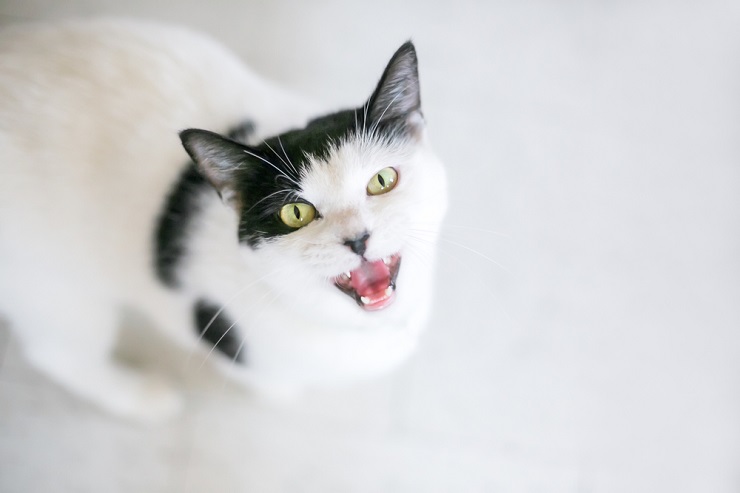
Some chatter may be a way for them to express frustrations and let off some steam.
Another reason for cat chatter is that it expresses frustration. This can be seen when they can see prey that they cannot reach – such as bird watching through a window. Some people also find that non-hunting house cats might chatter while waiting for their dinner to be put down.
Since cats are often tense in these situations, it may be that the jaw movement is a way for them to let off some steam. Again, it’s not clear why cats chatter when they are frustrated, but it does seem to be the case.
3. Mimicry
There’s some evidence that wild cat species use mimicry to confuse their prey and help lure them out from hiding. Researchers recorded a margay (a type of wild cat ) mimicking the sounds of their prey (pied tamarin monkey). This technique encouraged the monkeys to climb down from the trees and investigate.
Although the cats were unsuccessful in their hunt, their ability to mimic their prey in order to lure them to the kill was astonishing; it showed a level of cunning in cat behavior that researchers had not realized before. It’s possible that cats chatter and chirp to mimic birds and lure them in. However, cats also chatter at other animals like squirrels, suggesting the chattering may not be as simple as pure mimicry.
4. Sneezing
There are a lot of reports on the internet that cats chatter when you sneeze. It’s not clear why this might be. Some people like to say the cat is laughing, while others think it’s a sign of annoyance.
Annoyance sounds seem more likely – a sneeze is loud, which can be annoying. It’s a similar emotion to frustration, and so may produce a similar response.
Another explanation is that your cat chatters when you sneeze because they are ‘tasting’ the air. The up-and-down movement of the mouth when chattering may work in a similar way to the flehmen response, allowing cats to sort pheromones, scents, and other chemicals in the air.
5. Communication With People
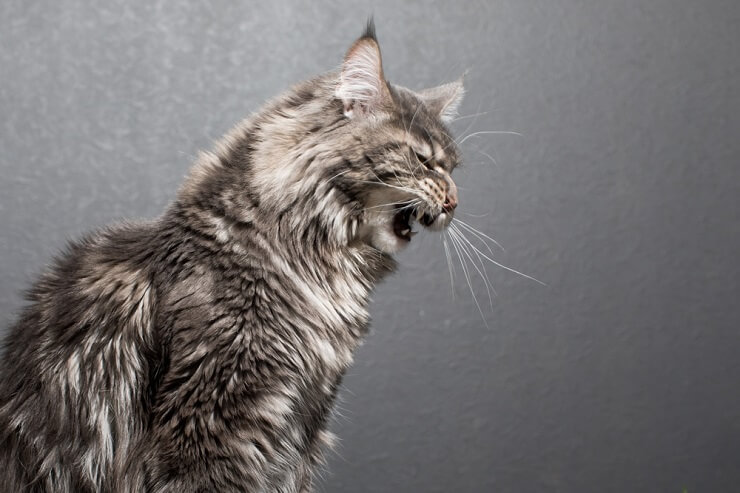
If your cat starts chittering at you, try responding with playtime or food and see what happens.
As we’ve discussed above, cats only really meow around people. So, could teeth chattering be a way to communicate with people too? Most definitely! Since we gullible humans respond with ‘oohs’ and ‘aahs’ and give our cats treats whenever they do something unusual or funny, cats may use chattering as a way to manipulate us.
They know chattering is a way to get attention or a treat, so they chatter at humans as a way to ask us for something. If your cat starts chittering at you, try responding with playtime or food and see what happens.
Summary
Nobody really knows why cats chatter, but there are many plausible reasons. Try reading your cat’s body language to determine if they’re excited or frustrated next time they’re making that chattering sound, and respond with a play session to work off some of that predatory instinct.
On the whole, the chattering noise seems to be a benign communication and not a sign of a health issue, but if your cat is doing it very frequently or has any other symptoms you should consider scheduling a vet visit.
Also Read: 6 Reasons Your Cat Makes Weird Noises At Night
Frequently Asked Questions
Why do cats chatter at their owners?
It’s not clear why cats chatter at their owners, but it’s likely that they are asking for something, or they’re frustrated by something. If you always follow their chatter with attention or a treat then it’s likely they’re expecting a reward!
Do cats chatter when happy?
Nobody really knows for sure why cats chatter, but there are a lot of possible explanations. Most often, cats seem to chatter when they’re watching birds outside the window, so we tend to interpret the chatter as predatory behavior or frustration… but it might simply be that they’re happy watching ‘cat TV’!

